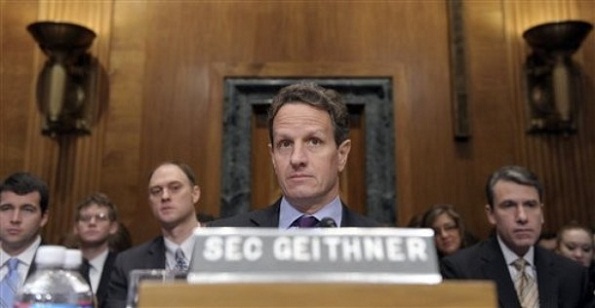
The press all over the world is debating the repercussions of the imminent agreement between Greece –and the EU– and the International Institute for Finance (IIF), chaired by Charles Dallara and which holds $206 billion of the the total $350bn of Greek sovereign bonds (the ECB has another $60bn).
According to the Financial Times, the agreement would require a haircut of 68% but what seems to be the most difficult to issue to resolve is that it would require that it be ‘voluntary’ by 100% of all entities involved so as to avoid a ‘credit event’ caused by the collection of insurance (credit default swap or CDS) contracted on Greek debt. But the truth is that today, those default insurances amount to a little over 1% of the Greek outstanding debt, exactly $3.700bn.
The answers to the how and why of this figure can be found in an article published by Juan Laborda, in which Geithner’s crucial role is highlighted
“in two events that have to do with Europe. Both make it clear that with friends such as this, Europe does not need enemies.”
THE IRISH BAILOUT: GEITHNER’S INTERFERENCE
In a must-read article published in the Irish Time, Morgan Kelly, an Irish academic, detailed the discussion on the Irish rescue in late 2010. The ECB and the Wall Street man, Timothy Geithner, went against the defence by the IMF that haircuts were to be had (a sane conclusion on the current financial and economic crisis by the then IMF boss Domnique Strauss-Kahn).
Geithner, along with the ECB and insisting they are ‘independent’, have always defended the creditors when, in fact, the most successful rescues were those where it was basically the creditors who paid, as in the Swedish bank bailout of 1992.
GREECE: GEITHNER’S PRIVATE AGREEMENT WITH LEADERS OF THE EUROPEAN UNION
In a recent interview, Michael Hudson, professor of Economics at the University of Missouri and economic consultant to various governments from China and Iceland to Lithuania, among others, highlights the role of Geithner in the Greek crisis. In the Fall of 2011, it was clear that Greece would not be able to pay off its public debt. The EU reached the conclusion that it was necessary to depreciate the debt by 50%. The alternative was a default on the total amount of the debt.
This 50% haircut on the Greek debt seemed radical, but the European banks had already covered their debts and subscribed default insurances: American banks were the issuers of a large portion of those insurances. In December of 2011, Obama’s Secretary of the Treasury, Geithner, traveled to Europe to meet with European leaders and demanded that Greece’s debt be depreciated based on voluntary haircuts on the part of banks and creditors. He explained that American banks had counted on Greece not going bankrupt, and that for the same reason, their net worth status was so precarious that if they had to pay for their gambling, they would also go bankrupt.
Geithner threatened to tear down European economies and their banks; he wanted to avoid that American banks pay the collateralised debt obligations (CDOs) and for other gambles they had taken and in which had invested billions of dollars.
The Europeans exploded with indignation. However, Geithner ended up proposing a deal: The White House would allow the bankruptcy of Greece but the US needed time. He agreed to open a line of credit from the Federal Reserve (Fed) to the European Central Bank (ECB). The Fed would provide money to banks in the interim, when the European governments’ finances would falter. Banks would be given time so as to undo their bankruptcy guarantees. In the end, the ECB would be the creditor.
The ECB and presumably the Fed would bear the costs ‘at the taxpayers’ expense’. US banks, as well as European ones, would avoid having to carry the weight of the losses that would run into the ground their net worth status:
“a new gift to the banks and a new adjustment for citizens”, explains Laborda.
Those ‘other bets’ placed by American banks on Greece include the CDS contracted in a shallow market that the EU has already faced.





Be the first to comment on "Mr Geithner wins: CDSs today rule, yet only cover 1% of Greek sovereign debt"